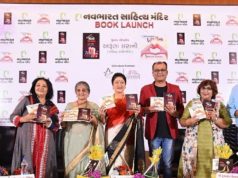New Delhi (16th Jan 2013) : Gujarat Finance Minister Shri Nitinbhai Patel today urged the Central Government to extend 90% assistance for Desert Development programme (DDP) areas at par with Drought prone Area Programme (DPAP) areas, for all projects under the Accelerated Irrigation Benefit Programme (AIBP). He also suggested that funding pattern of Centrally sponsored schemes should not be changed to the disadvantage of the States for the duration of a Five Year Plan period.
He said that the current economic scenario needs a strong vision for sustained growth. Financial self reliance of the States needs to be strengthened so that they continue to contribute to India’s GDP.
While speaking at the pre-budget meeting convened by Union Finance Minister Shri P. Chidambaram to obtain ideas and suggestions from State Governments, Shri Patel appraised that under present AIBP guidelines, Central Government provides financial assistance to the tune of 90% in Drought Prone Area Programme (DPAP) areas and only 25% in Desert Development Programme (DDP) areas. Certain command areas of Saurashtra, Kutch and North Gujarat besides some parts of Rajasthan fall under DPAP and DDP areas but are not covered under AIBP and therefore Gujarat Government is not getting requisite benefit under the AIBP scheme. The issue should be settled once and for all by extending 90% assistance for DDP areas, the Minister stated.
Gujarat has taken a leap forward in the inter-basin transfer of water by constructing Sardar Sarovar dam and its associated canal system. Planning Commission has recently approved the revised cost of the project at the level of Rs.39,240 crore. With the completion of the project, additional irrigation potential to the extent of 12.96 lac hectares would be created particularly in Drought Prone Desert areas. The State Government should get financial assistance under the programme, he requested.
Shri Patel said that Gujarat welcomes well—rounded effort for reforming the indirect tax system that would rationalize tax collection as well as improve economic efficiency across the nation but loss to States’ revenues due to switch to GST should be compensated by the Centre. Dues of CST should be re-imbursed by the Central Government, he suggested.
Shri Patel said that due to Vibrant Gujarat it has been possible to attract investments from India and abroad. GoI should evolve appropriate GST design so that development is encouraged and the States contributing to development and growth of country’s GDP do not face difficulties.
Taking the issue of reduction of custom duty from 5% to 0% on import for ship breaking, Gujarat Minister strongly demanded that Government of India should consider waiver of Custom Duty on import of ships and bring it at par with import of melting scrap.
Under Right to Education Act, in Gujarat it is estimated that an amount of Rs. 6333 crore is required to fulfill the responsibilities arising from the RTE Act. With an annual recurring expenditure of Rs.1300 crore, the Central Government should fully fund this additional expenditure and not to put additional burden on the state exchequer. Similarly, under Right to Food Act adequate provision should be made in the Union Budget to enable States to bear the additional burden of food subsidy.
Shri Varesh Sinha, Additional Chief Secretary (Finance) also participated in the meeting.
Sources: Deputy Director of Information, Government of Gujarat







